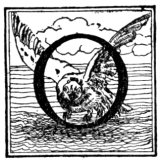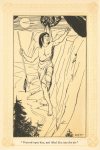
American Indian Fairy Tales, by Margaret Compton, [1907], at sacred-texts.com
 |
In those happy days there lived on that shore of the Big Sea Water, which is directly under the hunter's star, an Indian whom all his nation trusted, for there were none like him in courage, wisdom, and prudence. From his early childhood they had looked to him to do some great deed.
He had often mastered the grizzly bear
and the strong buffalo. Once he captured a buffalo ox, so large and so strong that a dozen arrows did not kill it, and from that day he was known as Mad Buffalo.
When the magic horns were needed for medicine for the people, Mad. Buffalo went forth in the Moon of Flowers and by cunning, not by magic, cut them from the head of the Great Horned Serpent. For this the people loved him and he sat with the oldest and the wisest of the tribe.
Their greatest trouble in those days was the mysterious thunder-bird, which was often seen flying through the air. It had black and ragged wings, and as it moved swiftly overhead they darkened all the earth. On moonlight nights no harm came; but when it passed in the daytime, or when the Moon-princess was journeying to see her brother, the Sun-prince, and her shining lodge was hidden by the beautiful red, the thunder-bird did evil to all who fell under its shadow.
Great curiosity existed as to its nest, but no one had dared to follow it, nor had any hunter discovered a place where it seemed likely that it could hide. Some thought it lived in a hollow tree, others that its home was in the sandstone caverns, but it had never been seen to alight.

Click to enlarge
“Pounced upon him, and lifted him into the air.”
One day in the winter, Mad Buffalo set out in search of food for his family. He had to travel to the lodge of the beavers across the Big Sea Water and far up the river. He trapped a fat beaver, slung it over his shoulder and started for home just as the full moon showed through the tree-tops.
While crossing the lake, when he was in sight of his own wigwam, a great shadow passed before him, shutting out all light. After it had gone he looked about him for the cause. The night was clear and the moon so bright that the hunter's star could be seen but faintly, but objects about him were as plain as in the day.
At first he saw nothing, for the thunderbird was directly over his head; but as it circled he caught sight of it. It made a swift movement downwards, pounced upon him and lifted him with all he had into the air.
He felt himself rising slowly till he was far above the earth, yet not so far as to prevent him seeing what was going on in the village. He could even see his own wigwam and his children in the doorway. They saw him and were terribly frightened. Their mother failed to comfort them, for they knew by heart all the
dreadful tales that were told of the thunder-bird. They themselves had seen the beautiful birch tree which they had often climbed, torn up by the roots and lie black and dead in the forest. And the oak tree where the warriors assembled was split to its base by this terrible creature. The yellow cedar whose boughs were used for the canoe that sailed on the Big Sea Water was scorched and blighted by the thunder-bird.
Mad Buffalo's heart did not fail him. He grasped his spear firmly and waited his chance to do battle with the monster. Faster and faster they went towards the north, straight across the Big Sea Water, rising higher and higher in the air.
At last they came to a great mountain where no trees grew. The top was a solid, bare, rugged rock, while the sides were formed of sharp boulders, with here and there a small patch of coarse grass and a few stunted furze bushes. In a cleft of the highest rock overhanging the water was the nest of the thunder-bird. It was made of the tendons of human beings, woven with their scalp locks and the feathers they had worn when living.
Still Mad Buffalo was not afraid. As the bird neared its home it croaked and
muttered, and the sound was echoed and re-echoed till the noise was deafening. Worse than this, the creature tried to dash him against the rock, driving him towards it with its wings; and when these struck him his flesh stung and smarted as if touched by coals of fire.
By violently wrenching himself and balancing his spear, he managed to escape uninjured. At length with one powerful blow the bird drove him into its nest. It then flew away.
Mad Buffalo was stunned, but only for a moment. On coming to himself he heard a low crackling noise of thunder and found that he was left to the mercy of a brood of wild, hungry young thunders, for whose food he had probably been brought. They began at once to pick at his head, uttering croaks like the old bird, only not so loud; but as they were many the sound was, if possible, more dreadful.
Seeing that they were young birds, Mad Buffalo supposed they would be helpless; and when the old bird was out of sight he ventured to fight them. Raising himself as well as he could, he struck at one with his spear. Thereupon they all set upon him, beating him with their wings and blinking at him with their long, narrow,
blood-red eyes, from which darted flashes of lightning that scorched his hands and face. In spite of the pain he fought bravely; though, when they struck him with their sharp wings, it was like the prick of a poisoned arrow or the sting of a serpent.
One by one their strength failed them and they were beaten down into the nest. Mad Buffalo took hold of the largest and strongest, wrung its neck and threw it over the precipice. On seeing this the others crept close together and did not offer to touch him again.
He seized another, pulled out its heart, threw the body away and spread the skin over the edge of the nest to dry. Then filling his pipe from a pouch of wolf skin suspended from his belt, he sat down to smoke. While resting he wrung the necks of the other birds and threw them into the Big Sea Water, saving only their hearts and claws.
When he had killed them all he took four short whiffs at his pipe, pointing as he did so to the kingdoms of the four winds, and asking them for assistance. Then he got inside the dry skin, fastened it round him with the claws he had saved, put the hearts of the young thunders on
his spear and started to roll down the side of the mountain.
As he tumbled from rock to rock the feathers of the skin flashed like fire-insects. When he was about half way down he straightened himself out and, lifting the wings with his arms, found that he could fly. He moved slowly at first, but was soon used to the motion and went as fast as the great bird could have done.
He crossed the Big Sea Water and winged his way over the forest until he came to the place from which he had been taken ten days before. There he alighted, tore off the bird's skin and started homewards.
His wife and children could hardly believe that it was he; for they supposed the young thunders had long ago picked his bones. He broiled the hearts of the birds, which crackled and hissed so that they could be heard a mile from the wigwam, but the meat was juicy and tender.
The old bird was never seen again in that part of the country. Hunters who came from the Rocky Mountains say that it built a nest on the highest peak, where it raised another brood that sometimes
came down towards the earth, despoiling the forests and the grain fields. But they flew higher than formerly, and from the day that Mad Buffalo fought them they never interfered with men. Their nest henceforth was made of the bones of the, mountain goat and the hair of his beard.
Now when Indian children hear the fire crackling they say it is the hearts of the young thunders; for all their nations know of the brave deed of Mad Buffalo.